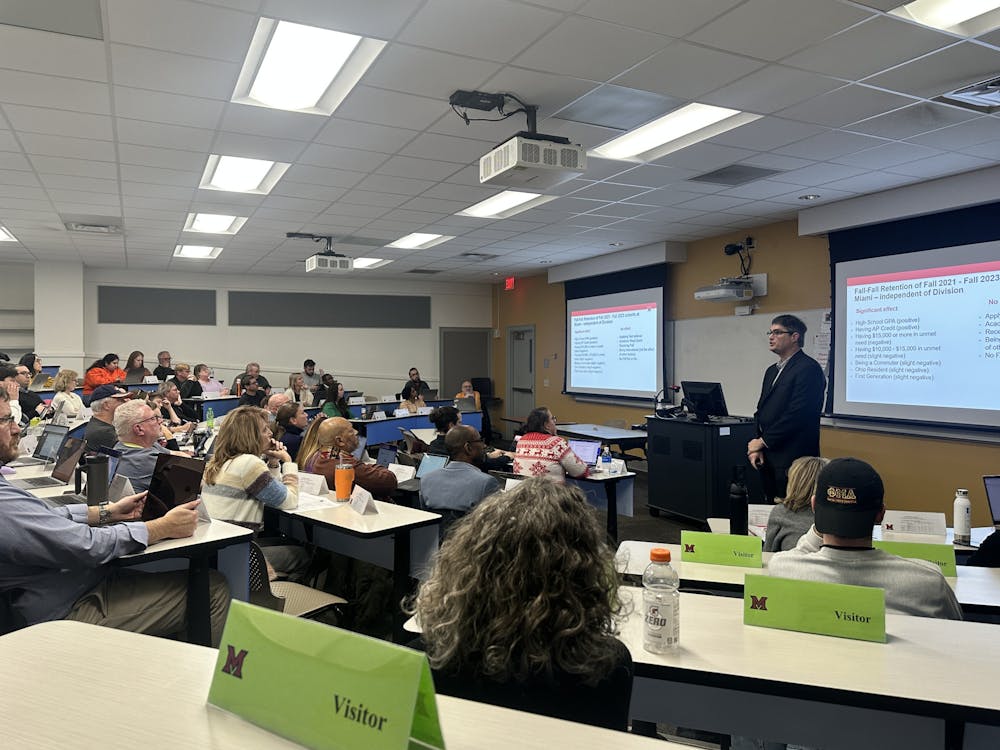Director of Admissions Bethany Perkins and Assistant Vice President of Research and Analytics Steve Graunke announced that admissions to Miami University will remain test-optional at the University Senate meeting on Dec. 2.
The updated policy marks a continuation of the suspension first implemented in the 2021 admissions cycle when the COVID-19 pandemic closed high schools around the country.
“We have learned that because test scores were always part of holistic and contextual review and were never the end all be all as a part of admissions evaluations, that [the suspension] has not had an effect on retention and it has indeed had a very positive impact on our ability to spread awareness about Miami and practice more inclusive application reviews,” Perkins said.
Since the suspension, applications increased by 56%, first-generation applications increased by more than 150% and applications for students of color increased by more than 100%, with the average GPA remaining around the same, Perkins said. On the other hand, the admission rate decreased from 92% to 75%.
Admissions will now focus more on GPA and AP credits, especially for competitive programs. Although Miami will remain test-optional for enrollment, ACT scores can be considered for majors, such as certain math majors, that may require prerequisites before taking higher-level courses.
“This all comes with the caveat that as we grow in applications, we will grow in selectivity overall,” Perkins said.
Campus development
During the meeting, members also approved a recommendation for a new campus development master plan with one nay and one abstention. This comes after two members of the Miami planning committees presented to the senate during their Nov. 18 meeting.
The recommendation is in response to historic projects being proposed by the university administration on student and historic green spaces. A university-affiliated hotel could be developed in the northwest corner of Cook Field, which serves as a place for student intramurals and activities.
The university administration is also looking to replace Millett Hall with a new sports arena to be potentially located near Slant Walk, a dedicated historic green space as denoted in the Campus Exterior Space and Landscape Master Plan. The plan, created in 2004, is the only one to resemble a master plan.
This new plan urges the university to proceed cautiously when undertaking big projects like these and calls for more community input.
No official decisions have been made on future project sites as of November 2024.
Enjoy what you're reading?
Signup for our newsletter
Quantum computing major
The Senate also endorsed the proposed quantum computing major, which will start in the fall 2025 semester, with 11 nays and four abstentions. The Cleveland Clinic first recommended the program to President Gregory Crawford, serving as a pipeline into the company.
According to the proposal document, “As quantum computing is expected to revolutionize sectors such as pharmaceuticals, materials science, artificial intelligence (AI), and cybersecurity, there is a pressing need for professionals trained specifically in this field. The program aims to position Miami University as a leader in educating students to meet this demand by equipping them with the knowledge and skills to work on cutting-edge quantum computing applications.”
While there will be no quantum computer on campus, the Cleveland Clinic is partnering with the university to help provide students with resources to learn quantum computing, without having to visit the site in person. Cleveland Clinic is home to the first quantum computer focused on healthcare research.
While there has been enthusiasm for the program, some senators found concerns with how the decisions are made and are worried about overburdening the computer science department, which they believe may already be overburdened.
Cathy Wagner, senator and professor of English, said she wrote to faculty members in the Department of Computer Science and Software Engineering and others.
“The main concern they expressed was that this had been such a top-down process [and] they felt a lot of pressure to pass this, and there’s a concern that the decision hasn’t been sufficiently vetted,” Wagner said.




